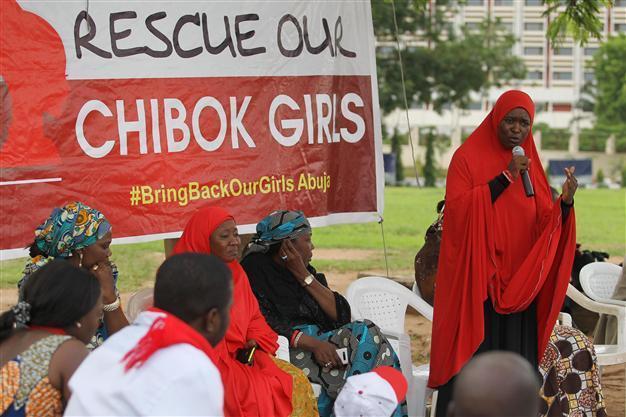Boko Haram abducts 60 women, girls in northeast Nigeria
MAIDUGURI, Nigeria - Agence France-Presse

A member of the #BringBackOurGirls Abuja campaign group addresses a sit-in protest at the Unity Fountain in Abuja June 18, 2014. REUTERS Photo
Suspected Boko Haram militants have abducted more than 60 women and girls, some as young as three, in the latest kidnappings in northeast Nigeria and over two months since more than 200 schoolgirls were seized.
Analysts said the kidnapping, which happened during a raid on Kummabza village in the Damboa district of Borno state, could be an attempt by the Islamist group to refocus attention on its demands for the release of militant fighters.
Boko Haram has indicated that it would be willing to release the 219 schoolgirls that it has held hostage since April 14 in exchange for the freedom of its brothers in arms currently held in Nigerian jails.
Nigeria initially refused to sanction any deal but efforts have since been made to open talks with the group, with a possible prisoner swap part of discussions.
The military in Abuja said in a tweet late on Monday that it could not confirm the latest abductions and spokesmen were not immediately available for comment when contacted by AFP on Tuesday.
But a senior officer in the Damboa local government, who asked for his name to be withheld as he was not authorised to speak on the matter, said: "Over 60 women were hijacked and forcefully taken away by the terrorists.
"The village was also destroyed," he said, adding that locals had fled their homes to other parts of Borno and across the state border into Adamawa.
"Among those abducted are children between the ages of three and 12," he added. Aji Khalil, a local vigilante leader, said: "Over 60 women were abducted by Boko Haram terrorists. They were forcefully taken away by Boko Haram terrorists.
"Four villagers who tried to escape were shot dead on the spot."
Damboa local government officials said they were afraid to speak out because of the controversy surrounding the Chibok abductions, with Nigeria's government coming under heavy criticism for its slow response.
Another resident, who fled to the Borno state capital Maiduguri and also requested anonymity, said that more than 30 men were killed during the raid, which began last Thursday.
"The attackers held the whole village hostage for the next three days," he added.
Boko Haram, which has been waging a deadly insurgency since 2009, used the kidnapping of women and young girls as a tactic even before the mass abduction of the schoolgirls in the remote Borno town of Chibok.
The Chibok abduction triggered a groundswell of outrage within Nigeria that spread overseas, leading to a social media campaign and international pressure on the government to act.
A number of countries, including the United States, are now involved in the search effort led by the Nigerian military.
Ali Ndume, who represents Borno in Nigeria's Senate, confirmed the latest abductions and said Boko Haram "took advantage" as people returned to the area to check on their farms during flooding when there was no military presence in the area.
"Boko Haram selected young males and females" as hostages, and "left the elderly", he said, amid local media reports that some 30 young boys may have also been taken.
Abductions have been a regular occurrence since the Chibok kidnapping, he added.
At least 20 young mothers from a nomadic settlement in and around the village of Garkin Fulani were also reported kidnapped on June 7, although it has since been claimed that the disappearances could be due to annual migration.
Ryan Cummings, a South Africa-based security analyst for Red 24, said the latest kidnappings could be a way for Boko Haram to redirect international focus on the Chibok hostages.
"It seemed that with international and domestic focus on the issue waning, so has the Nigerian government's efforts in finding a resolution to the hostage situation," he told AFP by email.
"It was reported on May 26 that the Nigerian government had rescinded on a hostage exchange agreement with the sect and that negotiations subsequently had stalled.
"The latest abduction, if confirmed, may be an attempt by Boko Haram to both resume and expedite hostage negotiations."
